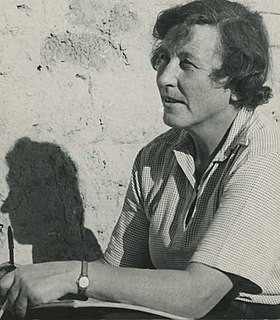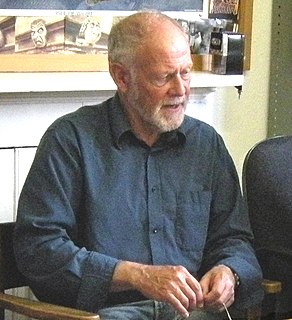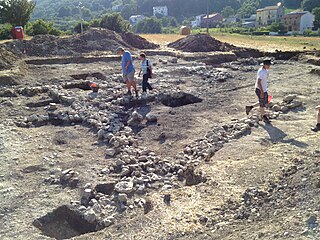Related Research Articles

Dame Kathleen Mary Kenyon, was a British archaeologist of Neolithic culture in the Fertile Crescent. She led excavations of Tell es-Sultan, the site of ancient Jericho, from 1952 to 1958, and has been called one of the most influential archaeologists of the 20th century. She was Principal of St Hugh's College, Oxford, from 1962 to 1973 and studied herself at Somerville College, Oxford.

Sir Barrington Windsor Cunliffe,, known as Barry Cunliffe, is a British archaeologist and academic. He was Professor of European Archaeology at the University of Oxford from 1972 to 2007. Since 2007, he has been an Emeritus Professor.

Richard Hodges, is a British archaeologist and past president of The American University of Rome. A former professor and director of the Institute of World Archaeology at the University of East Anglia (1996–2007), Hodges is also the former Williams Director of the University of Pennsylvania Museum of Archaeology and Anthropology in Philadelphia. His published research primarily concerns trade and economics during the early part of the Middle Ages in Europe. His earlier works include Dark Age Economics (1982), Mohammed, Charlemagne and the Origins of Europe (1983) and Light in the Dark Ages: The Rise and Fall of San Vincenzo Al Volturno (1997).
John Bryan Ward-Perkins, was a British Classical architectural historian and archaeologist, and director of the British School at Rome.

Sheppard Sunderland Frere, CBE, FSA, FBA was a British historian and archaeologist who studied the Roman Empire. He was a fellow at All Souls College, Oxford.
Graeme William Walter Barker, is a British archaeologist, notable for his work on the Italian Bronze Age, the Roman occupation of Libya, and landscape archaeology.
Geraint Dyfed Barri Jones was a classical scholar and archaeologist.

David John Mattingly, FBA is an archaeologist and historian of the Roman world. He is currently Professor of Roman Archaeology at the University of Leicester.

Jocelyn Mary Catherine Toynbee, was an English archaeologist and art historian. "In the mid-twentieth century she was the leading British scholar in Roman artistic studies and one of the recognized authorities in this field in the world." Having taught at St Hugh's College, Oxford, the University of Reading, and Newnham College, Cambridge, she was Laurence Professor of Classical Archaeology at the University of Cambridge from 1951 to 1962.
John Peter Oleson is a Canadian classical archaeologist and historian of ancient technology. His main interests are the Roman Near East, maritime archaeology, and ancient technology, especially hydraulic technology, water-lifting devices, and Roman concrete construction.
Andrew Ian Wilson is a British classical archaeologist and Head of School of Archaeology at the University of Oxford. He was director of the Oxford Institute of Archaeology from 2009 to 2011. Wilson's main research interests are the economy of the Roman world, Greek and Roman water supply, and ancient technology.

The Sangro Valley Project is an Anglo-American ongoing archaeological excavation in Abruzzo, Italy. It is notable for its revolutionary interpretation of Samnium as a dynamic participant in the history of the Adriatic as well as its early adoption of modern excavation technologies, such as GIS. The project currently managed by Oberlin College in collaboration with Oxford University, Durham University and the Soprintendenza per i Beni Archeologici dell'Abruzzo, is a multi-disciplinary team of specialists from Canada, Italy, the United Kingdom, and the United States.
John Joseph Wilkes, is a British archaeologist and academic. He is Emeritus Yates Professor of Greek and Roman Archaeology at University College London.
Dr Mary Aylwin Marshall, known as Molly Cotton, OBE, FSA, Hon FBA was a British archaeologist and former doctor, noted for her work in Iron Age Britain - particularly hill forts - and Roman Italy. She also trained archaeology students at the British School at Rome.
Nicoletta Momigliano is an archaeologist specialising in Minoan Crete and its modern reception.
Edith Mary Wightman FSA was a British ancient historian and archaeologist. She was Assistant-Professor and then Professor at McMaster University (1969–1983). Wightman was best known for her studies Roman Trier and Gallia Belgica.
Maureen Carroll is a British archaeologist and academic. She is the Chair in Roman Archaeology at the University of York.

Gary R. Lock is a British archaeologist and emeritus professor at the School of Archaeology, University of Oxford. He is noted for his contributions to computational archaeology.
Richard George Goodchild was a British provincial Roman archaeologist. He was one of the pioneers of archaeology in Libya.

The Department of Archaeology at the University of Sheffield, UK, is an academic department providing undergraduate and postgraduate courses in archaeology and its sub-disciplines based in the city of Sheffield, South Yorkshire. It conducts archaeological associated research with several dedicated research centres. It was founded in 1976, stemming from early archaeology programs in the 1960s as one of the first universities in the UK with a dedicated Department of Archaeology.
References
- 1 2 3 Pace, Eric (14 June 1999). "John Lloyd, 51, an Archeologist". The New York Times. ISSN 0362-4331 . Retrieved 7 April 2021.
- ↑ Barker, Graeme (22 October 2011). "Obituary: John Lloyd" . The Independent. Archived from the original on 13 June 2022. Retrieved 7 April 2021.
- 1 2 3 Barker, Graeme (November 1999). "John Lloyd (1948–1999)". Papers of the British School at Rome. 67: ix–xvi. doi: 10.1017/S0068246200004505 . ISSN 2045-239X.
- ↑ "Sangro Valley Project - School of Archaeology - University of Oxford". projects.arch.ox.ac.uk. Retrieved 11 April 2021.